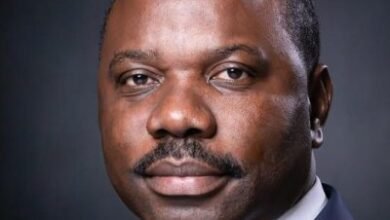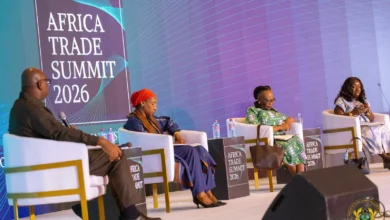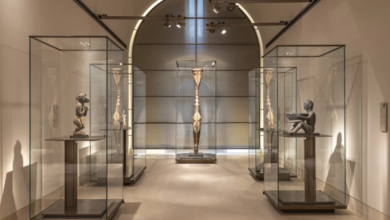Erik Mukuna : “Transmission is the key to consolidating the pan-African dream”
From its culture and history to its many economic potentials, Africa has all the arguments in the world to strive for development. Eric Mukuna, a player in the banking sector in the Democratic Republic of Congo and a keen debater on economic and financial policy, sets out what the roadmap should be.

By Eric Mukuna
Africa, the mysterious continent.
Africa, the paradox of superlatives.
A pride without history!
A sad reality, given the vastness of the continent, its multiculturalism and its scattered stakes, which at the same time remind us of its immense wealth! The bipolarization of the world, through ignorance of its historical heritage, has relegated Africa to second place in world geostrategy, even though it is a major player both in terms of surface area (3rd) and population (2nd).
Regarded by palaeoanthropologists as the cradle of humanity (on the East African side), the fact remains that in most analyzes and development indicators (human, economic, democratic, etc. ….), the African population is relegated to the back of the queue, with a few exceptions that make inroads depending on current events (political or civil), such as Morocco, Nigeria, South Africa, Kenya and Egypt.
Africa is studied, envied and all too often robbed through financial schemes involving the complicity of politicians, multinationals and strategic state interests!
Long renowned for its culture and riches, Africa is now struggling to achieve unity. And this immense continent – with its 30.5 million km2 and 1.4 billion inhabitants, and with the highest demographic growth rate (about 2.3 compared to the world average of 0.9) – is more than ever a major player on the world stage, and this can only be achieved through unity! A unity that has been weakened, unconsciously or not, by cultures, religions, neo-colonialist approaches, corruption, etc. ….
The appropriation of African culture in all its diversity is a necessity to better understand and defend our identity
The appropriation of African culture in all its diversity is a necessity in order to better understand and defend our identity. It’s also a prerequisite for a more solid front in other economic aspects of the international scene.
Today, many Africans and Afro-descendants are multicultural (often in Europe), and we must also take into account the « Afro-Americans » who are « Afro » only in the color of their skin. Without wishing to offend, I’m making an observation here, given the regular violence suffered by this community, a community which, in waves, tries to find out about its origins, as was the case with some fashionable Afro-American celebrities! Happy to have an « Afro » president, we forget that during his two terms in office he was unable to promote a process of cultural affirmation and identity both in the USA and with their distant African cousins. The result was even movements like « Black Lives Matter », which today’s Africans don’t feel concerned about.
This lack of cohesion between communities, both on African soil and internationally (in the diaspora), is a reflection of the different objectives, following the example of the Arab Spring, which fought for better living conditions but had little impact in black Africa, despite similar contexts! What conclusions can we draw? How is the African Union dealing with this problem from a psychological point of view and with the imperatives of variable geometry development?
The African population outside Africa (Afro-descendants, the diaspora), which, thanks to institutions and access to certain tools, is able to meticulously identify the political and economic stakes in the land of their ancestors, must now unite, organize itself into living forces, coordinate itself in strategic vigilance by identifying the actors, operators, militants, activists, technocrats, sociologists, philosophers… who, all too often in the shadows, carry out useful and often vital work in place of failing state systems!
Knowledge, the past and unity are all visions that need to be transmitted to the young and the not-so-young: transmission is the key to consolidating the pan-African dream.
As the saying goes:
« The death of an old man is the burning of a library ».
Amadou HAMPÂTE BÂ, speaking at UNESCO in 1960
In addition to Africa’s diverse, mixed culture – between 2,000 and 3,000 ethnic groups and almost 28% of the world’s countries – there is the richness of its soil and subsoil.
According to the United Nations Economic Commission for Africa (UNECA), Africa holds almost 55% of the world’s platinum reserves, 78% of its diamonds, 40% of its chrome… Not to mention other strategic minerals such as uranium and coltan, estimated at over 60% of the world’s reserves, which are located in the Democratic Republic of Congo!
The cost of private sector education is prohibitive for most, and the quality of conventional education is, with a few exceptions, deplorable
It is essential that young people take ownership of strategic sectors by raising awareness among the political class, understanding current and future global issues through the Sustainable Development Goals (SDGs), and realizing their capacity to be the next generation to be reckoned with. » Training, capacity building and re-skilling are all words that struggle to find their way into people’s minds!
The cost of private sector education is prohibitive for most, and the quality of conventional education is, with a few exceptions, deplorable.
The immediate result is corruption, famine, civil unrest and so on. There are so many crises that prevent the African population, which has been taken hostage, from taking its destiny into its own hands: « A hungry stomach has no ears », as the saying goes.
And aid, both bilateral and multilateral, is all too often an insult to the local beneficiaries of upstream contracts (which stifle local subcontracting) and projects that take no account of real needs on the ground. It’s only a matter of time before this waste of money becomes a crime!
Ghandi used to say:
« Whatever you do for me without me, you do against me ».
In the race for budgets, the mechanisms of certain institutions are limited to spending at all costs. As a result, international donors and facilitators lose interest in both the real and relevant needs of projects and their viability in terms of local community self-governance.
The challenges are enormous and, in most countries, seem insurmountable, leading to a brain drain to the West, rural exodus and overcrowding in the few large cities in these African countries, most of which were not designed for such large populations in our colonial past.
Each sector has its challenges: health, agriculture, education, energy…
The question is: what are the objectives of our political leaders who spend their holidays abroad, eat imported food and send their children to study in Canada, the USA or Europe?
What do our leaders do and say at international meetings when economic data is extrapolated and speculative, when most of the economic fabric is informal?
And in the context of African unity, let’s look at the lack of interconnectivity between our countries, despite competitive airlines such as Ethiopian Airlines, Royal Air Maroc, Kenya Airways and South Africa Airways.
With so many regional economic communities (AMU, COMESA, SADC, ECCAS, ECOWAS, etc.), which is the assessment ? What are the conclusions?
Our continent has its own peculiarities, its own wealth, its own cultures, its own challenges, and yet we are applying and copying the agenda of a world that is moving on without us.
The only upside to all this is to accept that, despite the challenges, it remains for many observers a major source of economic and financial opportunity. It is up to us to turn this situation to our advantage. South-South cooperation is an opportunity not only to boost the African economy, but also to enable Africa to compete on an equal footing on the world stage.
– Channelling and mapping financial assistance with a logical framework for appropriate projects, joining forces on major continental infrastructure projects (railways, highways, electrification, etc.).
– Promoting trade within a common agricultural policy. Countries are not fighting climate change in the same way, but they face the same challenges of self-sufficiency, food security and diversity.
– Identifying key sectors and organizing university exchanges (such as ERASMUS) based on each country’s specialities and capabilities, and working with other major universities around the world.
– Creating a high-level institution to enable certain leaders to improve their understanding of good governance within the African Union or elsewhere. There is no shame in this.
Henry Ford said:
« Anyone who stops learning is old, whether at twenty or eighty. »
Let’s not forget that the frustration of many Africans is to look at this beautiful continent, to share common values such as African solidarity, this ability and ease to call each other « brothers, » while having personal and often selfish ambitions of « to each his own » and then « you can’t help someone who doesn’t help himself ». The theory that the first to succeed in a community must provide for the community that prayed for his success overshadows his sacrifices and the exhausting commitment required to get out of a crumbling economic market.
We need to get involved, to take responsibility together and across the world. The African population (in Africa and with Afro-descendants) is large, with a young and active population that needs to specialize in order to be competitive in this African market that all the major groups and multinationals are courting (mining, telecommunications, audiovisual, digital, energy, etc.).
We must reduce our dependence by redefining the role model and meritocracy of brothers and sisters who excel in their fields. Who are the great men and women throughout the world and throughout history who have made a significant impact on the human condition in all fields (science, economics, sport, culture, etc.)?
Take, for example, the proud Congolese doctor who repairs women: Denis MUKWEGE, winner of the 2018 Nobel Peace Prize, or the African-American Mae Carol JESMISON, the first black woman to go into space in 1992. Who remembers the names of those who made history at the 1968 Olympic Games (Tommie Smith or John Carlos) or Abu Al Qasim, considered one of the greatest surgeons of the Middle Ages and one of the fathers of modern surgery?
There are a plethora of African personalities who should make these people proud. Too often they fail to recognize their contribution to history and their potential for a future in which we will be a major player. Just look at the economic and geopolitical stakes with the European Union, Russia, China and the United States…
Let’s strengthen ourselves so that we can negotiate more effectively. Let’s protect ourselves so that we can survive better, but above all, let’s respect each other so that we can survive better!
In the next 10 years, Africa will either be the master of its own destiny or in the hands of foreign interests. Laws must be harmonized and in line with our customs and traditions. They must also be implemented/applied and not just promulgated!
The struggle for a prosperous Africa must be a reality and not a political speech in the language of Molière. We must put an end to the intellectual masturbation of a group that is plundering our resources and our wealth at the lowest possible cost, at the behest of supranational forces whose networks of influence we dare not imagine.
Africa is worrying, Africa is poor, Africa is rich! Observers, research institutes and others know this: we must bet on Africa.
Power is not given, it is taken
Napoleon Hill
« Power is not given, it is taken », Napoleon Hill.
I’ll end with this Arab proverb: « He who learns without acting, plows without sowing. »






